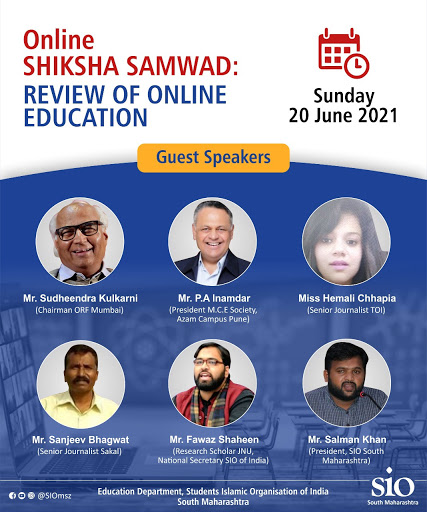Review of Online Education
Sunday 20 June 2021 (3:00 to 5:00 pm)
In his introductory talk, Shaikh Sohel, Education Secretary SiO South Maharashtra, said that, “The unexpected plague of a deadly infection called COVID-19 caused by (SARS-CoV-2) has trembled the whole world. This circumstance challenged the whole education system worldwide and compelled educators to change to an online mode immediately. Education institutions like Schools, Colleges and Universities in India are currently based on traditional learning methods and follow the conventional setting of face-to-face interaction/lectures in a classroom. According to a UNESCO report, around 14 crores of primary and 13 crores of secondary students have been affected in India, making them to be the two most affected groups. Many educational organizations that were earlier unwilling to change their traditional didactic practice had no choice but to move exclusively to online teaching–learning”.
Key Points of Discussion:
1.Accessibility of online Education
2.Repairing the damage caused to Education
3.Sustainability of Online Education: exacerbation of inequality, pedagogical issues leading to poor quality education and unwarranted thrust on online education, are the three pertinent issues with online education and its schemes that need serious consideration post COVID-19.
Mr Sudheendra kulkarni, Chairman ORF Mumbai, while sharing his valuable thoughts on the issue said, “We should be prepared for the future which contains the amalgamation of online and offline modes of education”. He further encouraged on pressurising the government to make digital learning tools affordable and accessible evenly. He strongly demanded development of non-English language based educational material, citing scarcity of its availability. He also mentioned the positive aspects of online education like it enabling us to network and connect, thus building new bonds of understanding, harmony and National and International Unity.
Mr P.A. Inamdar, President, M.C.E Society and Azam Campus Pune, said that, currently our country doesn’t even have trained enough teacher for this mode of education, for such a huge student population, particularly at primary and secondary school level. He raised certain questions related to availability of resources like finance and technical tools needed for online education in rural areas of this country. He said that he agreed to the fact that ultimately the education system will move towards online mode, but it will take time and effort in accommodating the changes. He suggested a hybrid structure such that 80% of the education be conducted by offline mode; and the rest 20% be conducted online, and the percentage of online education be improved gradually.
Hemali Chhapia, senior journalist TOI, said that the online education system has both pros and cons, which needs to be balanced. She said even though this mode of education has many positive aspects, country like India, which has such a large digital dived is facing grave problems like many students being left out of the education system itself because of this change.
Br fawaz Shaheen, national secretary, SiO of India, in his concluding remark, said that, it is not the technological crises but the social isolation that is leading to these issues. He further said that it was time to discuss fundamental issues like the way to evaluate students, the way to evaluate learning and so on, and not merely discuss the gaps created due to Covid-19. He suggested on working on the policy level advocacy and expose the deep-rooted flaws in our education system; essentially lack of basic education infrastructure for such a huge population in our country.

No comments:
Post a Comment